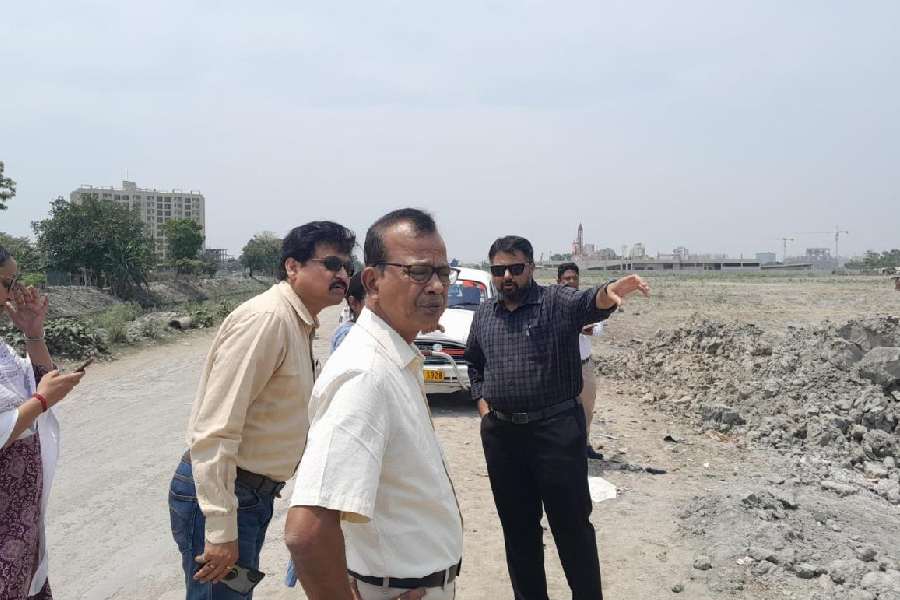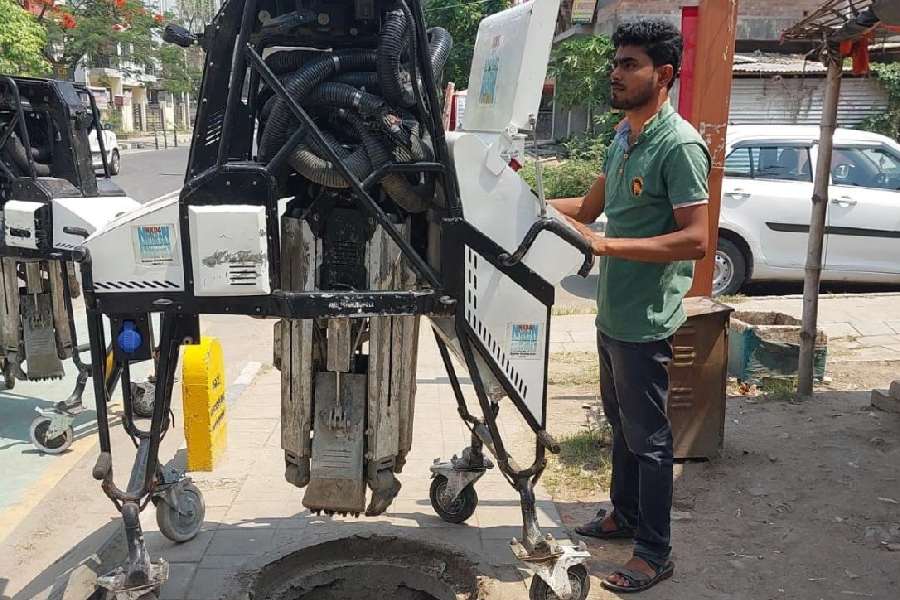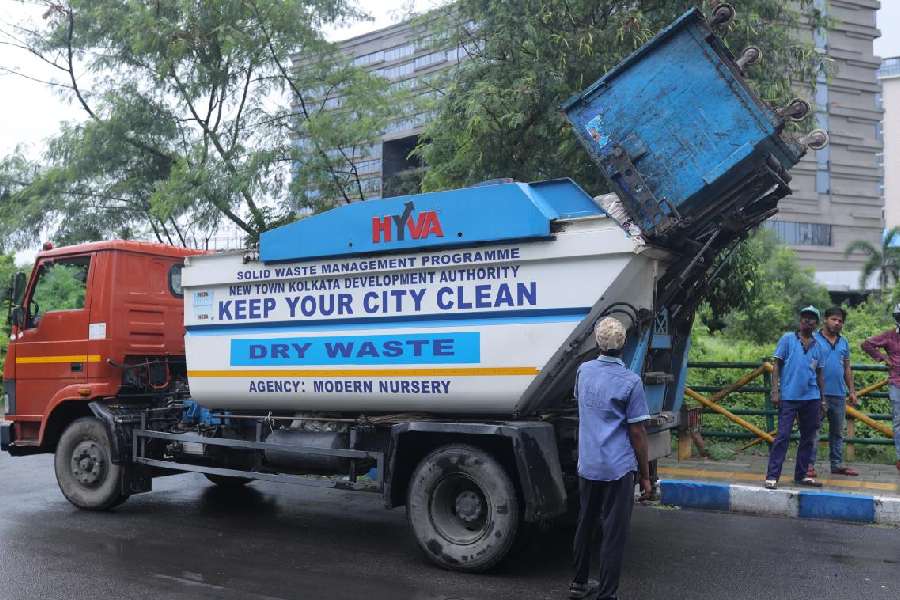The solid waste management system in New Town will get a complete makeover with the local civic body earning a laurel in the form of a sizeable grant in a nationwide competition.
New Town is one of the 18 cities across the country that has qualified for a share of a Rs 1,496 crore booty as part of the CITIIS 2.0 challenge.
A team from the CITIIS Programme Management Unit at the National Institute of Urban Affairs (NIUA) visited New Town last week, on April 22, for the first round of inspection under CITIIS 2.0.
“New Town as a Smart City has evolved as truly an exemplar for the whole country. The focus of the challenge is solid waste management,” said Alapan Bandyopadhyay, the new chairman of NKDA.
The challenge
CITIIS 2.0 is the second phase of the City Investments To Innovate, Integrate and Sustain (CITIIS) programme that aims to drive investments into urban climate action through competitively selected projects promoting a circular economy with focus on integrated waste management. Circular economy refers to a system where waste is reused and recycled to decrease the use of natural resources and limit greenhouse gas emissions.

NKDA officials show the CITIIS 2.0 team a site for a waste processing plant in Action Area II, New Town.
This drive to promote the reuse and recycling of waste generated in urban areas is part of a larger mission to foster climate-sensitive planning and action in states and cities that will help in achieving India’s commitments to combat challenges posed by climate change. At COP26, the United Nations Framework Convention on Climate Change, held in Glasgow in November 2021, India has set itself the target of achieving net zero emissions by 2070.
The CITIIS programme has been conceived by the housing and urban affairs ministry in collaboration with the French Development Agency (AFD), KfW Development Bank, the European Union and NIUA.
New Town could not take part in the first CITIIS challenge, in which 12 cities were selected, as the state government had initially decided to opt out of the Smart Cities project. Twelve cities had qualified then. Two years later, in 2018, the township joined the mission.
The ministry of housing and urban affairs communication launched CITIIS 2.0 in November. “We had barely a month and half to prepare. The mission director himself flew over from Delhi to hold a workshop, which we hosted, to explain the rules to representatives of four states. After that, we held a seminar and a day-long camp at Smart Connect to prepare the proposal. We also had to get concurrence from the state government as there is a financial obligation from the state as well, which the finance department had readily given,” recalls Debashis Sen, the former NKDA chairman and Hidco MD.
According to a ministry communication issued at the launch of the programme, the CITIIS grant amount for each project under it will be limited to 80 per cent of the total project cost, up to Rs 135 crore. The additional funds, i.e., 20 per cent of the total project cost, will have to be mobilised by the selected city through its own source funding by the state government.
CITIIS 2.0 is being funded through an external funding of Rs 1,866 crore (EUR 212 million). This includes a loan of EUR 100 million each from AFD and KfW, i.e., a total loan of Rs 1,760 crore (EUR 200 million), and a technical assistance grant of Rs 106 crore (EUR 12 million) from EU.
Of the 100 Smart Cities under the Smart Cities Mission that were eligible to compete in the challenge, 84 threw their hats in the ring.
Road to success
Meghna Pal, chief executive officer, Newtown Kolkata Green Smart City Corporation, executive engineer Sandip Ganguly and two colleagues flew over to make the presentation, which took place on February 8 at the NIUA office at India Habitat Centre.
The result was declared on March 4 by the Union minister of housing and urban affairs Hardeep Singh Puri. The winning cities are Agartala, Agra, Bareilly, Belagavi, Bilaspur, Guwahati, Jabalpur, Jaipur, Madurai, Muzzafarpur, Panaji, Rajkot, Srinagar, Thiruvananthapuram, Thanjavur, Udaipur, and Ujjain, other than New Town.
“Unlike the first edition of CITIIS which did not have a theme, this time the theme was solid waste management, which includes both peripheral and ancillary management. With an eye on the projected population of New Town in 2030, we prepared a zone-based modular plan, with proposals for developing pocket-wise infrastructure to reduce vehicular movement,” she told The Telegraph Salt Lake.
Under the plan, three integrated waste processing plants will be built, for which Hidco has already identified three spots. “The project cost will come to Rs 172 crore, so we expect to get the entire ceiling amount of Rs 135 crore as grant.”

A robotic scavenger at work
Currently New Town generates about 85 tonnes of waste per day. Once the plants are in place, the capacity will go up to 500 tonnes per day.“The CITIIS team had advised us to scale up our waste treatment to make the plants viable. So while our project area is 30 sq km, another 90 sq km in the periphery has been included in the solid waste management plan,” Pal said.
There was another pressing reason to deal with the waste of the neighbourhood. “People from the panchayat areas dump waste in our bins, often in the dead of night, though they do not pay us property tax. There are highrise complexes on the fringes of New Town which have even offered to pay us property taxes if we collect their waste.
The panchayats of Patharghata and Jyangra-Hatiara have written to us with requests to deal with their area’s solid waste. So we have decided to integrate these areas in our solid waste collection plan,” said an official.
The step will also help control the mosquito population, the officials hope. “Recently, we did an aerial survey with a drone to locate such dumping points and identified 164 such in the Bidhannagar Municipal Corporation (BMC) area, the Bagjola canal sides and the panchayat fringes. We alerted the BMC and the gram panchayats concerned with location coordinates but nothing happened,” the official said.
While there will be doorstep collection in the project area (New Town proper), collection points will be set up in the peripheral areas where haulage vehicles will be sent. The locations will be decided by the district administration in consultation with the respective panchayats after the election.
The authorities have set themselves a target of zero landfill dumping. “No waste should reach the landfill. Bricks, flyash and other construction waste will continue to be sent to the Patharghata plant of Kolkata Municipal Corporation, which has come up on Hidco land. While wet waste will be composted, dry waste will be processed at the materials recovery facility which will be there at each of the three plants. There are seven-eight categories of waste segregation which will be done. The mixed waste now is sent to the Dhapa landfill as we do not have a processing plant. We hope to significantly reduce this volume,” Pal said.
The next 12 months will be the maturation phase of the project which will see experts coming over periodically to check on the progress. They will send project reports periodically to the international partners. On the basis of their inputs, the plan will be fine-tuned, the DPR (detailed project report) drawn up and tender floated for electric compactors, electric vehicles for collection, smart bins (that send a signal to the control room when it fills up), etc.
“This time we showed the team the spots selected for the three processing plants. They suggested some surveys dealing with waste segregation, the findings of which will improve our DPR. A workshop will be held in Delhi in May, which we will have to attend, while another team from Delhi will visit in June,” said Pal.
The plan will have to be implemented by 2027.
